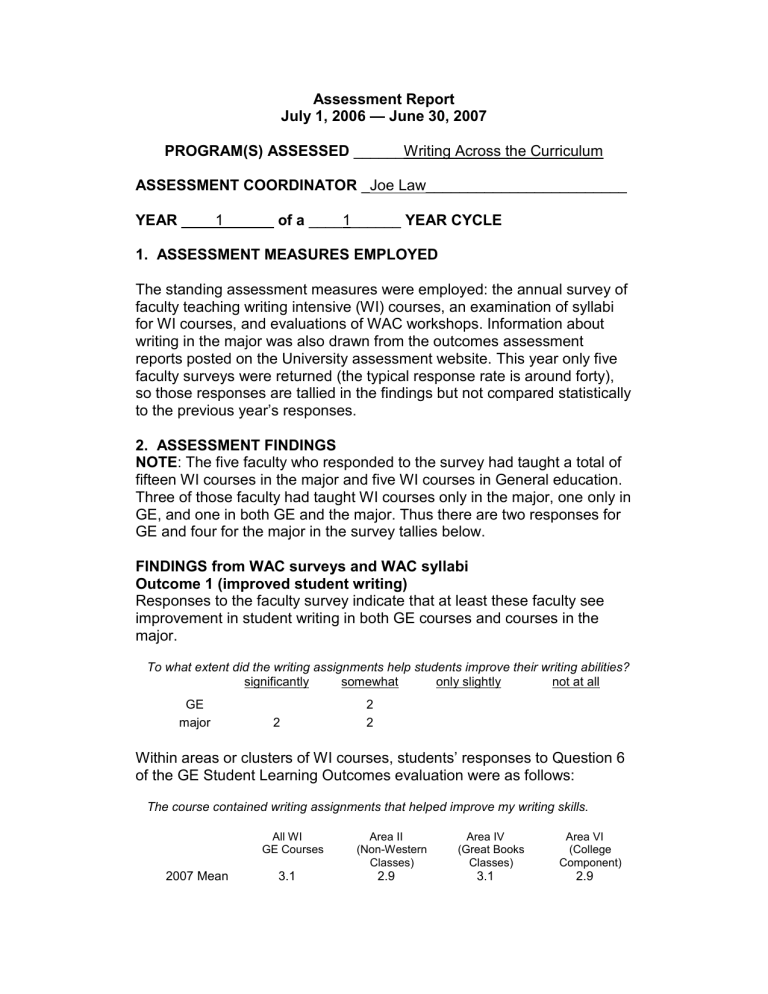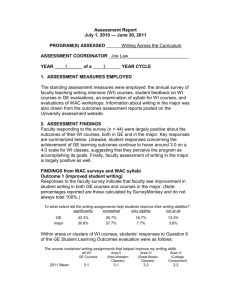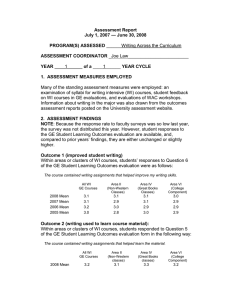Writing Across the Curriculum

Assessment Report
July 1, 2006 — June 30, 2007
PROGRAM(S) ASSESSED ______Writing Across the Curriculum
ASSESSMENT COORDINATOR _Joe Law________________________
YEAR ____1______ of a ____1______ YEAR CYCLE
1. ASSESSMENT MEASURES EMPLOYED
The standing assessment measures were employed: the annual survey of faculty teaching writing intensive (WI) courses, an examination of syllabi for WI courses, and evaluations of WAC workshops. Information about writing in the major was also drawn from the outcomes assessment reports posted on the University assessment website. This year only five faculty surveys were returned (the typical response rate is around forty), so those responses are tallied in the findings but not compared statistically to the previous ye ar’s responses.
2. ASSESSMENT FINDINGS
NOTE : The five faculty who responded to the survey had taught a total of fifteen WI courses in the major and five WI courses in General education.
Three of those faculty had taught WI courses only in the major, one only in
GE, and one in both GE and the major. Thus there are two responses for
GE and four for the major in the survey tallies below.
FINDINGS from WAC surveys and WAC syllabi
Outcome 1 (improved student writing)
Responses to the faculty survey indicate that at least these faculty see improvement in student writing in both GE courses and courses in the major.
To what extent did the writing assignments help students improve their writing abilities? significantly somewhat only slightly not at all
GE major 2
2
2
Within areas or clusters of WI courses, students’ responses to Question 6 of the GE Student Learning Outcomes evaluation were as follows:
The course contained writing assignments that helped improve my writing skills.
2007 Mean
All WI
GE Courses
3.1
Area II
(Non-Western
Classes)
2.9
Area IV
(Great Books
Classes)
3.1
Area VI
(College
Component)
2.9
2006 Mean
2005 Mean
3.2
3.0
3.0
2.8
2.9
3.0
2.9
2.9
Outcome 2 (writing used to learn course material):
The five responses to the faculty survey indicate that these faculty believe that their students see the connection between writing assignments and the course objectives, and
—more significantly—all strongly agree that these assignments actually help students learn the course material in GE courses and in the major.
To what extent did students seem to see a link between the writing assignments and the learning objectives of your WI course? significantly somewhat only slightly not at all
GE major
1 1
4
To what extent did the writing assignments help students learn the course content? significantly somewhat only slightly not at all
GE 2 major 4
Within areas or clusters of WI courses, students responded to Question 5 of the GE Student Learning Outcomes evaluation form in the following way:
The course contained writing assignments that helped learn the material.
2007 Mean
All WI
GE Courses
3.2
Area II
(Non-Western classes)
3.0
Area IV
(Great Books classes)
3.3
Area VI
(College
Component)
3.1
2006 Mean 3.1 3.2 3.2 3.0
2005 Mean 3.1 2.9 3.2 3.0
Outcome 3 (introduction to disciplinary writing)
Responses to the faculty survey indicate that students are learning disciplinary conventions of writing . The one “not at all” response was accompanied by a note explaining that disciplinary writing had not been addressed in that course.
To what extent did the writing assignments help students learn the writing conventions of the field? significantly somewhat only slightly not at all
GE 1 1 major 1 3
Course syllabi that include information about writing assignments indicate that disciplinary concerns are being addressed, particularly in CONH and
CEHS
—both “professional” colleges—where expectations for writing are often identified in grading rubrics. Syllabi from other colleges tend to provide less information about writing assignments, especially grading criteria.
Findings from University Outcomes Assessment Reports
The assessment plans of a number of academic departments address the development of students’ writing abilities within the major. These plans often call for faculty review of student writing and other direct means of assessment. The following findings are drawn from the most recent (2005-
06) assessment reports posted to the University Assessment webpage
(http://www.wright.edu/assessment/bpra/outcomes/reports.html).
CLASSICAL HUMANITIES: All six of the papers reviewed by departmental faculty represented a level of writing appropriate for a college graduate, with four of the being exemplary and one being weak. The report presents this finding as a success: “Clearly the departmental emphasis on writing is working.
”
COMMUNICATION: In COM 200, students exhibited both a statistical and qualitative improvement in writing skills are a result of instruction. Across the sections of COM 200, the improvement noted average was 17.5 percent from beginning to end of the course.
ENGLISH: Faculty committees reviewed papers collected from advanced literature courses to evaluate students’ ability to “develop a thesis and sustain a coherent written argument about literature using secondary sources.” Findings were mixed. According to the review, most students were able to state a thesis about literature, but many were judged “competent” in their ability to develop a coherent argument.
HISTORY: The Undergraduate Curriculum Committee reviewed seventeen papers from HST 401. The found that thirteen students met the standard for writing proficiency, two students exceeded the standard, and two failed to meet the standard. They also looked at whether each student’s written work demonstrates analytical, organizational, and critical skills. Eleven students met the standard, four students exceeded it, and two failed to meet it.
I NTERNATIONAL STUDIES: Faculty evaluated twelve papers and reported a success rate of approximately 80% in meeting goals concerning writing, research, critical thinking and problem-solving skills. They also report that the average IS major took nearly 14 writing intensive courses (eight more than is usually required)
PHILOSOPHY: Faculty examined three papers from graduating seniors, concluding that all evidenced a level of writing appropriate to a college graduate, with one being superior.
POLITICAL SCIENCE: The position paper of the Model UN team was awarded top ranking among 220 college and universities in the
position paper category (papers were judged by a staff of 75 at the conference). Additionally, employers report strong writing and critical thinking skills among the department’s graduates.
Congressm an Turner’s office, for example, with interns from Miami,
UD and Wright State, reported the strongest writing skills were demonstrated by WSU political science interns.
RELIGION: Faculty examined papers written by twelve graduates, all of which “evidenced a level of writing appropriate to a college graduate. Five of the papers represented excellent writing skills in both mechanics and in effective communication.”
SOCIAL WORK: Review of the writing assignment that is part of the capstone course indicates tha t students’ performance remains high, “especially in the writing mechanics.” The average grade on the paper in Spring 2006 was 35.60 out of 40 possible points, similar to the average grade on the paper in Spring 2005.
ANTHROPOLOGY: Portfolio reviews indicated that students produced coherent work that, in general, substantively addressed assigned topics. On a 10-point scale, grammatical ability averaged
7.9, the force and appropriateness of the arguments employed rated an average of 7.6, and suitable documentation averaged 7.1
WOMEN’S STUDIES: On an alumnae survey, one student wrote, “I have used these skills every day. Grant writing is a major part of my job and putting the skills I have learned through my writing assignments has helped me frame the need and purpose of the job to the funders.” Additionally, faculty who reviewed student papers found that all used sources critically, had proper structure and grammar, and demonstrated proper development and support of a thesis.
ENVIRONMENTAL HEALTH: Review in the department concluded that students have appropriate “communication skills, both oral and written, for technical administrative and public arenas.”
GEOLOGICAL SCIENCES: The single senior thesis completed during the assessment period was found to meet the writing assessment criterion established by the department: “
Although the scientific content may not merit publication, the style alone would not prevent the paper from being submitted for publication .”
Likewise, 80% of the term papers from GL 486 Invertebrate
Paleontology were found to meet this criterion.
MATHEMATICS/STATISTICS: Faculty teaching selected advanced undergraduate courses, including “capstone” courses
MTH 491-492 / STT 492, were asked for their assessment of students’ “ability to communicate effectively the mathematics they have learned, in both written and oral form.” A “plurality” of respondents indicated that students performed “very well”; “lesser numbers” of students were rated “fairly well” or “not well.”
PSYCHOLOGY: In a survey of upper-level students, 79% of the respondents indicated they felt that the curriculum provided opportunities to develop skills in effective oral and written communication. Faculty instructing five advanced special topics methods courses rated 35.1% of their students as having the ability to communicate findings effectively. Faculty teaching fourteen capstone courses put 77.2% of their students at this level.
Workshop Evaluations
The evaluations distributed after each workshop uniformly indicate that those who attended were satisfied with the discussions that took place and the materials they received. A number of evaluations indicated that the workshop material would prove valuable in classroom practices.
3. PROGRAM IMPROVEMENTS
Although the number of responses to the WAC survey was unusually small, they remain consistent with previous years’ data. The majority of the respondents say that the writing assignments had a clear impact on helping their students to write better and even more respondents connect the s tudents’ writing with their learning. Likewise, departmental outcomes assessment reports suggest that writing within the major seems generally satisfactory.
Beginning Fall 06, a new position was created in conjunction with
English
—the WAC faculty consultant—to provide additional opportunities for working with faculty teaching WI courses in the major. Although no formal assessment has been designed to measure the effectiveness of this consultation, feedback from faculty involved has been very positive.
The Winter 07 WAC newsletter includes an account of the results of the consultation with one faculty member, and a panel about the collaboration has been proposed for the biannual national WAC conference in 2008.
4. ASSESSMENT PLAN COMPLIANCE
No focus groups were held with either students or faculty this year. These may be revived in 2007-08.
5. NEW ASSESSMENT DEVELOPMENTS
N/A




